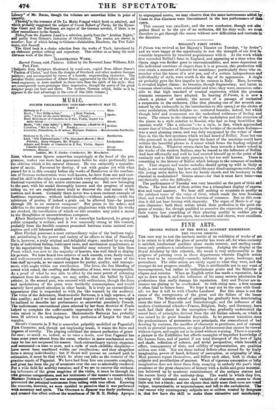MUSIC.
Bonn= riansseemosuc coarcesr—morankr MAY 12.
PART I.
sustonia in F Ries.
Recit., " Der nUte selbst," 1Herr Pischek. " Liebe ist die zarte Bliithe," f (Potato First Movement of Concerto in E flat, Violin, Signor Ca-
millo Rived Slvort. Suitt, "Oh I mkt fedell,"11fdlle. Bertacat, (Beatrice di i Beinni. Cavadna, " Ma la sola," s Tender,)...-
Concerto, Pianoforte, in D minor, Madame Bilk-ken • • Mendelasohn Bartholdy.
Parr II.
Sinibnia in D, (No. 2) Beethoven.
Lied, "Die Fatmenwacht," (The Standard-Bearer,) Herr
Pischek ; Harp Obligate, Mr. Wright Lindpainter. Adagio and Rondo of Concerto in E fiat, Violin, Signor Camille Slyer! Sivori.
Overture, Egmont Beethoven.
Leader, Mr. T. Cooke—Conductor, Mr. Moscheles.
Rams, whose name figures somewhat surprisingly at the head of the pro- gramme, makes one more last appearance before he sinks profoundly into the oblivion which is his natural element. He was eminently a manufac- turer of music. Favoured by destiny, if not with genius yet with what passed for it in this country before the works of Beethoven or the mechan- lain of' German orchestration were well known, he drew from one and exer- cised his skill in the other in a manner which very effectually served the pro- fessional reputation of his active existence among us. But now belonging to the past, with his model thoroughly known and the progress of music aiding us, we are enabled more truly to discover the real nature of his position and desert. Certainty there never was a more eminent example of factitious reputation: without individualityy--without melody—with the minimum of genius, if indeed a grain can be allowed him—he passed through life as an eminent composer! But peace to his ashes; and oblivion to the memory of the numerous plagiarisms with which his works are stocked, the recollection of which on this occasion may point a moral to the thoughtless or unconscientious composer.
Albeit Beethoven's Symphony in D is somewhat hackneyed, its grasp of public sympathy is certain; and it was unusually strong at this concert, probably from the forcible contrast presented between warm natural con- ception and cold laboured artifice.
Herr Pischek possesses a most extraordinary- voice of the baritone regis- ter, assimilating in the power and variety of its effects to that of Staudigl. Ha is, however, a truly original and delightful singer • marked by as strong traits of individual feeling, cultivated taste, and mechanical acquirement, as by his superlatively fine tone. The beautiful song selected by him from Faust, which was new to the majority of hearers, was well fitted to display hie powers. We here heard two octaves of such smooth, even, finely-toned, and well-connected notes, extending from A fiat on the first space of the bass staff upwards, as we cannot compare for purity, quality, and manage- ment, with aught within our recollection. The force, the fine blending of sound with sound, the swelling and diminution of tone, were incomparable. As a proof of what he was able to effect by the mere power of colouring obtained from his noble organ, we may notice, that the ballad by Lind- painter, in the second part, was encored with enthusiasm, though the form and modulations of the piece were decidedly commonplace, and would. scarcely have gained attention in other hands. it is truly an extraordinary appearance that is responded to with the like warmth by the auditory. The voice of the debutante, Mademoiselle Bertucat, is a high soprano, of a thin quality; and if we had not heard good singers of all nations, we ;night be inclined to describe her performance as somewhat peculiarly French. The unfortunate oonventional piece selected by her from Beatrice di Tender helped to complete the unfavourable impression which the tones of her voice raised in the first instance. Mademoiselle Bertucat has probably been M advised in exchanging her first profession of harpist for that of vocalist Svorf a Concerto in E flat is somewhat palpably modelled. on Pavinini's Firs' t Concerto; and, though not unpleasing music, it wants the force and impress of novelty. The playing exhibited the utmost perfection of grace ful ease; so much so, indeed, as to raise a doubt, now that Paganini has beca some years absent from the scene, whether in mere mechanic..1 accu- racy he has not surpassed his master. Such extraordinary variety, elegance, and command--e. tone so pure, and a style of such childlike simplicity— have never been combined within our recollection; and they altogether form a strong individuality: but if Svori will pursue en onward path in estimation, it must be that which he alone can take as the restorer of the genuine music of Paganini. We have bad from him one concerto complete, and great has been the joy of amateurs over the one so admirably rendered. But a wide field for activity remains; and if we are to recover the enchant- ing influences of the great magician of the violin, it must be through his oma genuine compositions, and not imitations of the master's eccentricities. Madame Dukken's Concerto was accompanied somewhat too lond; which prevented the principal instrument from telling with true effect. Knowing the concerto, however, we were enabled to perceive that it was performed with accuracy and spirit. The Overture to Epagole was finely performed; and created due effect without the trombones of Sir H. R. Bishop. Apropos to expurgated scores, we may observe that the same instruments added by Costa to .Doa Giovanni were discontinued in the late performance of that . opera.
This concert was excellent; and the new conductor, though not alto gether fitted to be the eye of an orchestra, did his duty well: we trust. therefore to get through the season without new difficulties and contests nit ' the direction.


























 Previous page
Previous page